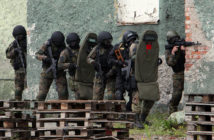Moroccan Interior Minister Mohand Laenser (right) hosts his Tunisian counterpart Lotfi Ben Jeddou (centre) and Algerian Interior Minister Daho Ould Kablia (left) on April 21st.
Maghreb states reiterate the need to jointly address regional security threats.
Interior ministers from Arab Maghreb Union (UMA) countries last week-end in Rabat adopted a draft security strategy.
The Rabat Declaration, approved at the April 21st meeting, highlighted the “desire for consultation and co-ordination expressed by the member states, especially in the fields of security and counterterrorism”, Moroccan Interior Minister Mohand Laenser said.
Terrorism, organised crime, drug trafficking and civil protection topped the meeting’s agenda.
Terrorism “needs to be tackled jointly, through on-going co-ordination. This is because Maghreb countries are neighbours and belong to the same regional area, and face common challenges and threats”, according to the declaration.
They also stressed the importance of drying up terror funding. In particular, they suggested making it a criminal offence to pay ransoms to terrorists. The ministers vowed to form a security partnership between Maghreb and Sahel states.
Maghreb countries need to intensify information exchange about activities of terror groups, their locations and sources of funding, the ministers agreed.
They reiterated the need to follow up on resolutions adopted by the Council of Ministers of Religious Affairs last September in Nouakchott. Last year, Maghreb ministers agreed to promote the Malikite school of Islam to immunise Maghreb societies from radicalism.
“Common strategies need to be developed to tackle the indoctrination of young people by terrorist organisations,” the Rabat Declaration underlined.
In addition, the ministers agreed to strengthen the fight against drug trafficking. They urged more “exchange of expertise, information and technological knowledge to unveil the sources of these drugs and methods of their traffic and to detect money generated from this activity in order to confiscate it and prevent its laundering”.
To implement these decisions in practice, the interior ministers agreed to hold annual meetings and appoint a follow-up committee that will report to the UMA General Secretariat and convene every three months.
Experts, however, warn that the decisions may be hard to enforce in reality, given the countries’ political divergences.
“The ministerial meetings of the UMA are continuing, but they are doing little to realise the idyllic dream of Maghreb societies,” Khalid Chegraoui, a research professor at the Institute of African Studies, told Magharebia. “Many declarations and resolutions arising out of this kind of meeting are leading nowhere because of a lack of willingness on the part of certain political entities within the UMA.”
“By virtue of its final statement, the latest meeting is quite positive on the whole, but we are very doubtful that it can be implemented because of the contradictions between the political and security agendas in the region,” he added.






